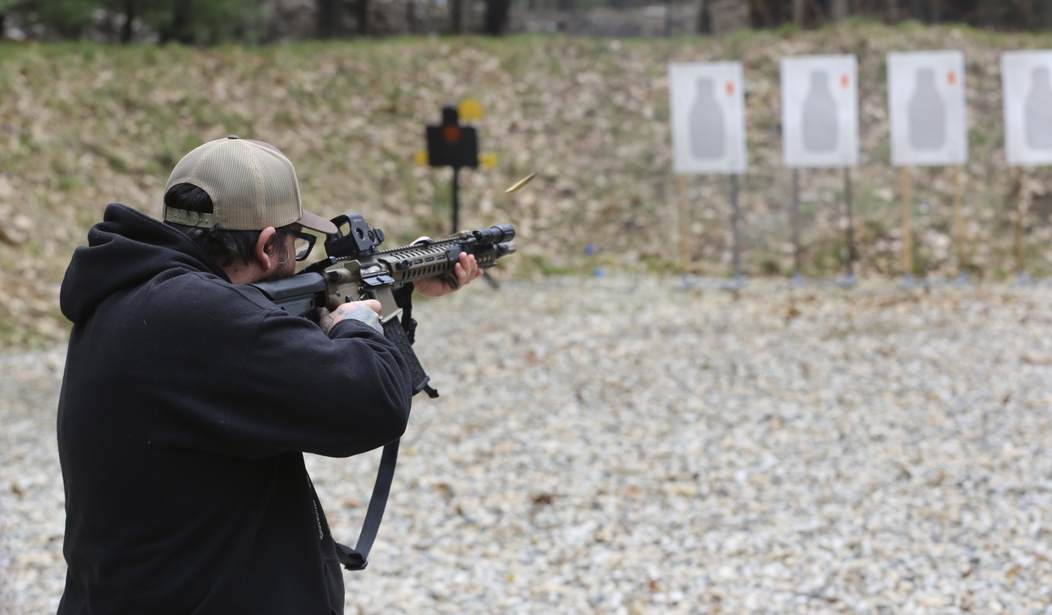House Democrats, in their ongoing quest to make it more difficult for Americans to possess firearms, managed to sneak a red flag provision into the latest iteration of the National Defense Authorization Act (NDAA). The legislation was passed last week and is headed to the Senate.
Bearing Arms’ Cam Edwards explained:
The military version of the red flag law proposed by Democrats looks a lot like the civilian version found in more than a dozen states. Without being charged or even accused of a crime, a service member could have their right to possess a firearm taken away from them by a military court, and the subject of the red flag order wouldn’t even have a chance to provide any evidence on their behalf for up to 30 days after the court’s order was issued.
Edwards noted that there are “fundamental flaws” with the legislation. He wrote:
Just like with the red flag laws in place in states from California to Connecticut, if a person is found (through a lowered standard of review than what is used in a criminal proceeding) to be a danger to themselves or others by a judge, there’s no actual mental health component to the order removing guns. A supposedly dangerous person can be left with knives, pills, poison, gasoline and matches, and any other tool they might use to take their own life or the lives of others as long as any legally owned guns are taken away.
Edwards also pointed out that each state and the military already have “civil commitment laws on the books.”
But what is noteworthy about the passage of this legislation is that 135 Republican lawmakers voted for it. Gun Owners of America (GOA), a gun rights advocacy group, addressed some of the excuses these Congress members used to justify their “yes” vote. They tweeted:
Some House RINOs who supported Red Flag laws in the #NDAA on Thursday are falsely claiming the bill doesn’t really have gun confiscation orders for the military.
Maybe they didn’t read the bill, but we did.
Let’s not forget that many pro-gun Republicans voted against the #NDAA (H.R. 4350) because it had Red Flag laws in it.
Thanks again to our Second Amendment warriors @RepBoebert, @chiproytx, @RepCloudTX, @RepBobGood and @RepDanBishop.
— Gun Owners of America (@GunOwners) September 25, 2021
This is not the first time anti-gun Democrats attempted to hide a red flag provision in the NDAA. They did the same thing last year.
Here is a list of each Republican Congress member who voted in support of the NDAA with the red flag provision intact:
Rick W. Allen – Georgia
Mark E. Amodei – Nevada
Don Bacon – Nebraska
James R. Baird – Indiana
Troy Balderson – Ohio
Jim Banks – Indiana
Andy Barr – Kentucky
Cliff Bentz – Oregon
Jack Bergman – Michigan
Stephanie I. Bice – Oklahoma
Gus M. Bilirakis – Florida
Mike Bost – Illinois
Kevin Brady – Texas
Vern Buchanan – Florida
Larry Bucshon – Indiana
Ken Calvert – California
Kat Cammack – Florida
Jerry L. Carl – Alabama
Earl L. “Buddy” Carter – Georgia
John R. Carter – Texas
Madison Cawthorn – North Carolina
Liz Cheney – Wyoming
Tom Cole – Oklahoma
Eric A. “Rick” Crawford – Arkansas
Dan Crenshaw – Texas
Rodney Davis – Illinois
Scott DesJarlais – Tennessee
Mario Diaz-Balart – Florida
Neal P. Dunn – Florida
Jake Ellzey – Texas
Pat Fallon – Texas
Randy Feenstra – Iowa
Drew Ferguson IV – Georgia
Scott Fitzgerald – Wisconsin
Brian K. Fitzpatrick – Pennsylvania
Charles J. “Chuck” Fleischmann – Tennessee
Virginia Foxx – North Carolina
Scott Franklin – Florida
Matt Gaetz – Florida
Mike Gallagher – Wisconsin
Andrew R. Garbarino – New York
Bob Gibbs – Ohio
Carlos A. Gimenez – Florida
Tony Gonzales – Texas
Anthony Gonzalez – Ohio
Kay Granger – Texas
Garret Graves – Louisiana
Sam Graves – Missouri
Mark E. Green – Tennessee
Brett Guthrie – Kentucky
Diana Harshbarger – Tennessee
Vicky Hartzler – Missouri
Jaime Herrera Beutler – Washington
French Hill – Arkansas
Ashley Hinson – Iowa
Trey Hollingsworth – Indiana
Richard Hudson – North Carolina
Darrell Issa – California
Ronny Jackson – Texas
Chris Jacobs – New York
Mike Johnson – Louisiana
Bill Johnson – Ohio
Dusty Johnson – South Dakota
David P. Joyce – Ohio
John Joyce – Pennsylvania
John Katko – New York
Fred Keller – Pennsylvania
Trent Kelly – Mississippi
Mike Kelly – Pennsylvania
Young Kim – California
Adam Kinzinger – Illinois
David Kustoff – Tennessee
Darin LaHood – Illinois
Doug Lamborn – Colorado
Robert E. Latta – Ohio
Jake LaTurner – Kansas
Julia Letlow – Louisiana
Billy Long – Missouri
Frank D. Lucas – Oklahoma
Blaine Luetkemeyer – Missouri
Nancy Mace – South Carolina
Nicole Malliotakis – New York
Tracey Mann – Kansas
Kevin McCarthy – California
Michael T. McCaul – Texas
Lisa C. McClain – Michigan
Patrick T. McHenry – North Carolina
David B. McKinley – West Virginia
Peter Meijer – Michigan
Daniel Meuser – Pennsylvania
Carol D. Miller – West Virginia
Mariannette Miller-Meeks – Iowa
John R. Moolenaar – Michigan
Blake D. Moore – Utah
Gregory F. Murphy – North Carolina
Dan Newhouse – Washington
Devin Nunes – California
Jay Obernolte – California
Greg Pence – Indiana
August Pfluger – Texas
Tom Reed – New York
Guy Reschenthaler – Pennsylvania
Cathy McMorris Rodgers – Washington
Harold Rogers – Kentucky
David Rouzer – North Carolina
Maria Elvira Salazar – Florida
Steve Scalise – Louisiana
Austin Scott – Georgia
Michael K. Simpson – Idaho
Adrian Smith – Nebraska
Christopher H. Smith – New Jersey
Victoria Spartz – Indiana
Pete Stauber – Minnesota
Michelle Steel – California
Elise M. Stefanik – New York
Bryan Steil – Wisconsin
Claudia Tenney – New York
Glenn Thompson – Pennsylvania
Michael R. Turner – Ohio
Fred Upton – Michigan
David G. Valadao – California
Jefferson Van Drew – New Jersey
Beth Van Duyne – Texas
Ann Wagner – Missouri
Tim Walberg – Michigan
Jackie Walorski – Indiana
Michael Waltz – Florida
Brad R. Wenstrup – Ohio
Bruce Westerman – Arkansas
Joe Wilson – South Carolina
Robert J. Wittman – Virginia
Steve Womack – Arkansas
Don Young – Alaska
It is not yet clear whether the red flag provision will survive the Senate. While GOP lawmakers in the House might believe they will get away with supporting the legislation, Senate Republicans might not be willing to take such a risk — given the slim lead the Democrats have in the upper chamber. Moreover, there could be some Democrats who oppose the bill for various reasons.
Either way, it is important to keep an eye on this particular proposal. If the Democrats get their way, it could set a precedent that would make it easier for them to enact federal red flag laws on the rest of the country.













Join the conversation as a VIP Member